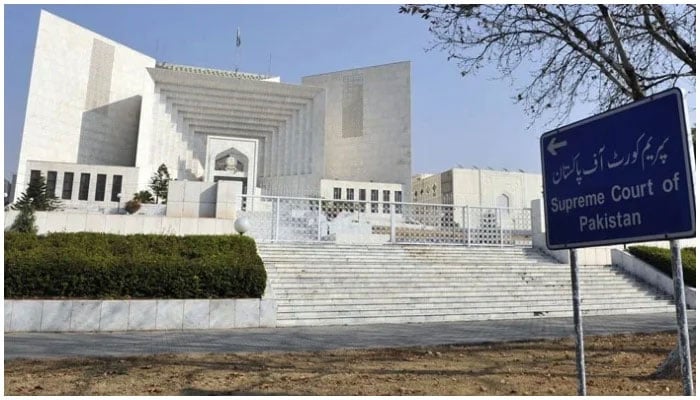SC’s larger bench to take up presidential reference on Article 63(A) on March 24
Government approached SC for interpretation of Article 63(A) as several PTI MNAs announced to vote against PM Imran Khan on no-trust motion
ISLAMABAD: Ahead of the voting on the no-trust motion against Prime Minister Imran Khan, the Supreme Court of Pakistan has constituted a five-member larger bench to hear the presidential reference filed by the government to seek the top court's opinion on Article 63-A, which deals with the disqualification of the lawmakers over defection.
The bench — which will hear the case on March 24 — will be headed by Chief Justice of Pakistan Umar Ata Bandial, with Justice Muneeb Akhtar, Justice Aijazul Ahsan, Justice Mazhar Alam, and Justice Jamal Khan Mandokhel.
The government had decided to approach the SC for interpretation of Article 63(A) as several PTI lawmakers announced to vote on the no-trust motion, in a violation of the party policy.
In the reference, the government sought the apex court’s opinion on two interpretations of Article 63(A) and which one should be adopted and implemented to achieve the constitutional objective of curbing the menace of defections, purification of the electoral process, and democratic accountability.
The reference stated if the constitutional disapproval and prohibition against defection was effectively enforced with deterrence for the future as well, many such members would stand disqualified for life under Article 62(1)(f) and would never be able to pollute democratic streams.
“It was barely a year ago in the wake of elections for the Senate that compelling evidence in the form of audio and video recordings showing horse-trading emerged leaving the identities of perpetrators in no doubt yet nothing meaningful has been done in that respect till date,” the reference read.
The reference stated: “The questions of law of public importance revolving around the interpretation of Article 63A of the Constitution have arisen in the context of the unending malaise of floor crossing and defections that have sullied and damaged the purity of the democratic process in the country for decades."
-
Security forces gun down 30 terrorists in multiple IBOs in KP: ISPR
-
MQM-P calls for new province in Sindh
-
US report validates Pakistan military edge over India: PM
-
Banned TTP poses serious threat to Pakistan security: UNSC panel
-
CM Afridi clarifies remarks on by-poll after ECP requests army deployment
-
Dubai sees 3.2m Pakistani passengers in 2025 as airport sets new milestone
-
Security forces kill 23 Indian proxy terrorists in KP's Kurram
-
Pakistan to construct island to boost oil exploration: report












